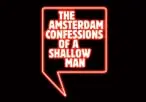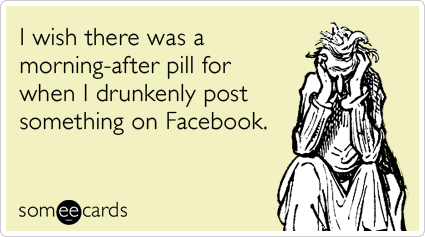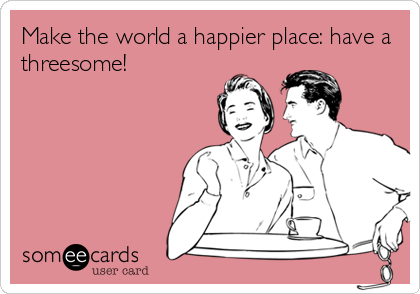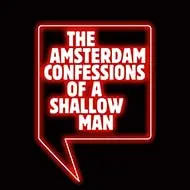Dutch Phrase of the Week, the Hangover Comes Later
If you followed the Shallow Man’s advice about Oud en Nieuw in the Netherlands, then on the first day of 2015, you may well have woken up with a hangover. If you were really lucky (or unfortunate), you might have woken up with a complete stranger in your apartment, asking you if you’d recorded the oudejaarsconference. The shock of this, and the resulting hangover, have probably made you swear to yourself that you’ll never visit Bar Italia (or any other smoky pick up joint) again. This brings me to the subject of today’s post, seven Dutch phrases related to overenthusiastic consumption of alcohol.
The knowledge of such phrases, will prove that you’re not just another bloody ungrateful expat here in the Netherlands to steal their hair gel addicted chaps, and hairdryer phobic women. Knowledge of these phrases will prove what an integrated expat you really are.
The things I do for my readers!
1. Ik ben (lichtelijk) Aangeschoten.
In het Nederlands
Deze uitdrukking gaat over het beginstadium van de effecten van alcohol. Het is een uitdrukking die vaak gebruikt wordt door giechelende pubermeisjes of vrouwen van middelbare leeftijd uit de provincie die een wijntje teveel drinken tijdens hun jaarlijkse uitstapje naar Amsterdam.
Aangeschoten komt van het werkwoord aanschieten: door een schot wonden, even raken.
‘Het hoogtepunt van het jaar van Els was het moment waarop ze lichtelijk aangeschoten was na het derde glaasje prosecco op oudejaarsavond’
In English
This lovely phrase refers to the beginning stages of the effects from alcohol. It’s mainly used by screaming young girls, or by middle aged women from the provinces, who’ve had a prosecco or two too many during their annual visit to Amsterdam. Such ladies can also often be heard trying to whisper “ZEG ER ZIJN ZOVEEL NEGERS HIER,” while walking along the scheldestraat in Amsterdam and spotting an exceptionally well dressed black gentlemen in a three-piece suit.
2. Ik Ben Dronken
Duidelijk. Zelfde als in het Engels. ‘I’m drunk’. That such a Dutch phrase even exists, comes as a shock to the Shallow Man. I’m often told by Dutch people, that the only drunks in Amsterdam are the British tourists here for a weekend, but as the phrase exists in Dutch….
Let op! niet te verwarren met: Ik drink- Ik heb gedronken. Het gaat hier namelijk echt om het resultaat: ‘ik ben dronken’. Omdat het een staat van zijn is, moet je hier het hulpwerkwoord (auxiliary verb) zijn gebruiken. Dit geldt ook voor de komende vier voorbeelden.
Warning! Not to be confused with I drink or I have been drinking. This phrase, as in English, is all about the end result, ‘I’m drunk.’ In English of course you add ‘as a skunk’ so you have a nice little rhyme, ‘I’m as drunk as a skunk’. In Nederlands, there’s no such rhyming equivalent that I’m aware of.

In the Dutch provinces, the locals often wake up following a night’s drinking feeling a little hoarse
3. Ik Ben Kacheltjelam
In het Nederlands
Dit is een samenstelling van kachel en lam. De losse uitrukkingen bestaan overigens ook.
Dus: ‘Ik ben kachel’ en ‘ik ben lam’, kun je ook apart gebruiken.
Een kachel is een heater/stove en lam betekent in het Engels zoiets als weak, lame. Het impliceert dat je echt enorm dronken bent. Zo dronken dat je nauwelijk nog naar huis kan fietsen.
In het Engels
‘Kachel’ and ‘lam’ are two words put together to achieve an effect. A ‘kachel’ is a heater/stove and lam has broadly the same meaning as ‘lame’ in English. So far so good. However, according to my Dutch teacher at Koentact, she claims that it means that you’re totally drunk, so drunk in fact that you can barely cycle home. As if that ever stopped a Dutch person hopping on a bike. In fact, the more drunk a Dutch person is (at least in Amsterdam) the more likely they are to cycle, completely oblivious of the mayhem they leave in their drunken wake.
There’s only one thing worst than a drunken cyclist, it’s two drunks on a bike, usually with a shouting woman pedalling, and a noble Dutchman sitting on the back of the bike, letting the woman do all the work. (I assume that their sex lives follow a similar pattern) Yes Dutch girls are so emancipated that a Dutch gentleman can allow his drunken lady to pedal away, while he checks his smartphone to see if the litres of hair gel he applied earlier in the evening, is still doing its job.
4. Ik ben Lazerus
In het Nederlands
Ik ben lazerus. Ook deze uitdrukking betekent dat je heel veel gedronken hebt. Praise the lord! Ook hier schemert de nooit aflatende calvinistische Hollandsche inslag weer door in de taal. Er zijn twee theorieën over de afkomst van deze uitdrukking maar dat het uit de bijbel komt is een feit. Alleen blijft de vraag: wie is Lazerus dan?
- Lazerus uit Johannes 11. Een man die uit de dood werd opgewekt en nogal wankelend op de benen stond na deze wederopstanding. De link met dronkenschap lijkt ons evident.
Wie Lazerus ook was, de betekenis staat vast. Deze uitdrukking wordt over het algemeen niet gebruikt door jonge mensen. Ik stel me altijd een oude priester voor die een halve wijnkelder tot zich neemt en dan uitroept: ‘Godverdomme wat ben ik Lazerus’!
In het Engels
I am Spartacus! Oops, sorry, I meant to say I am Lazarus!. For those of you not up on your bible stories, Lazarus was a man woken from the dead by Jesus after four days.
This phrase can be used when the following occurs:
- When you wake up with a hangover, where your head feels as if someone has played football with it, and your mouth is as dry as the bottom of a hamsters cage
- As a man, you’ve been drinking heavily all evening, you get home, and your Dutch female partner demands sex. You’re able to perform, at the final key, and explosive moment you can shout out, IK BEN LAZERUS!
- You wake up, in an unknown bedroom, in a part of town, you’d never normally visit. (e.g. Amsterdam North or the Schilderswijk) The person you’re with is the stuff of nightmares, the apartment smells, your head is throbbing, you can’t see straight, you don’t even know how you got there, and you’ve only a vague idea how to get home. You feel like throwing up. You escape, you find your way home, and then go to sleep for a long, long time. When you awake, you look at yourself in the mirror and shout IK BEN LAZERUS!
5. Ik ben Droeloe
In het Nederlands
Het woord droeloe is afkomstig uit het Surinaams en wordt vooral gebruikt door jongeren. Het begon eerst echt als street slang maar je hoort het tegenwoordig steeds meer (dus ook onder de vijftienjarige kakkertjes uit oud-zuid). De meeste Nederlanders boven de 30 zullen de uitdrukking niet kennen maar jij nu wel dus je kunt lekker shinen bij vrienden en familie. Je kunt het nog eens extra versterken door er koekoedroeloe van te maken.
‘Op die fessa* was iedereen koekoedroeloe’
*slang voor feest.
In het Engels
The photo below somes it up.
6. Ik heb te diep in het glaasje gekeken
In het Nederlands
Deze uitdrukking kun je zowel gebruiken om aan te geven dat je dronken bent op het moment zelf maar ook de volgende dag als je stinkend met koppijn in je bed ligt.
Betekent letterlijk/literally ‘I looked too deeply in the glass’.
Gekeken is de verleden tijd van het werkwoord: kijken.
7. Ik heb een kater. I have a cat. à I am hungover
In het Nederlands
Dit gebruik je de volgende dag als je teveel gedronken hebt en je ellendig voelt. Deze Nederlands-Duitse uitdrukking is afkomstig uit de Duitse studentenkringen. Het is een verbastering van het Duitse woord Katarrh (betekenis: verkoudheid, slijmvliesontsteking) en linkt ook terug naar een Duitse biersoort genaamd kater. Overigens associëren de meeste Duitsers en Nederlanders het vandaag de dag vooral met het ‘dier’ en niet met een verkoudheid of oude biersoort.
In het Engels
The Germans and the Dutch use essentially the same saying, ‘Ik heb een kater’. Which literally translated means I have a male cat. Somehow, this actually means, ‘I have one hell of a hangover!’ It’s something that you’ll hear British tourists in Amsterdam saying to each other over breakfast. That’s assuming that you eat breakfast in diabolical Irish pubs in and around the Leidesplein, or the Rembrandtplein. It’s also a very popular saying with ladies in their thirties, filling in the time between their part-time jobs, by hanging out with Lieke, Anouk, Tineke and Ida, in a local cafe, causing people on nearby tables to have bleeding ears, while they shout at the top of their voices, a local variant of this saying which is ‘Ik heb een houten kop.’
Either way, if you say ‘Ik heb een kater’ the locals will hate you just a little bit less, for at least 90 seconds.
As the great looney toons cartoons used to say, that’s all folks!
Proost!
Mocht je ondanks al je goede voornemens toch weer een glaasje teveel drinken onthoud dan wel:
De kater komt altijd later.
If you want to learn to speak Dutch properly, don’t forget to get in touch with the folks at Koentact, who actually, as their assistance with this post proves, have a sense of humor.
No cats were hurt during the writing of this post.
Till next time, houd je porem! (Amsterdam slang)















Actually, the word in Surinamese is droengoe. Maybe droeloe is the street language version?
Oh well, as long as your readers only try to impress young kids with it….and Dutch people that know no better. It should be alright! :).
Well I actually think that it is easier to cycle than to sit on the back of the bike (making sure your feet don’t touch the ground takes a lot of effort when you are tall). I can’t stand sitting on the back for longer than ten minutes, while I can easily cycle with someone on the back for 1,5 hours. 🙂